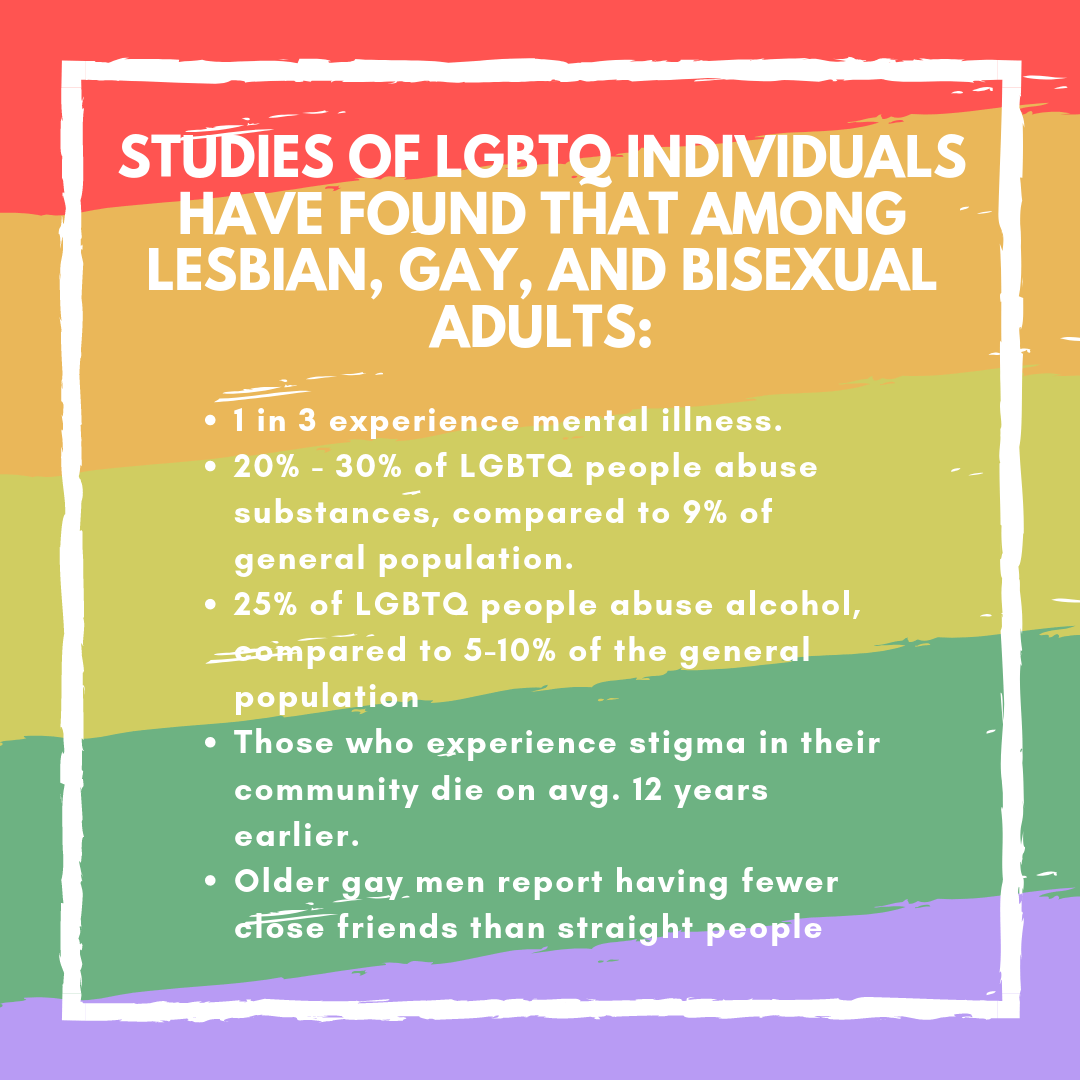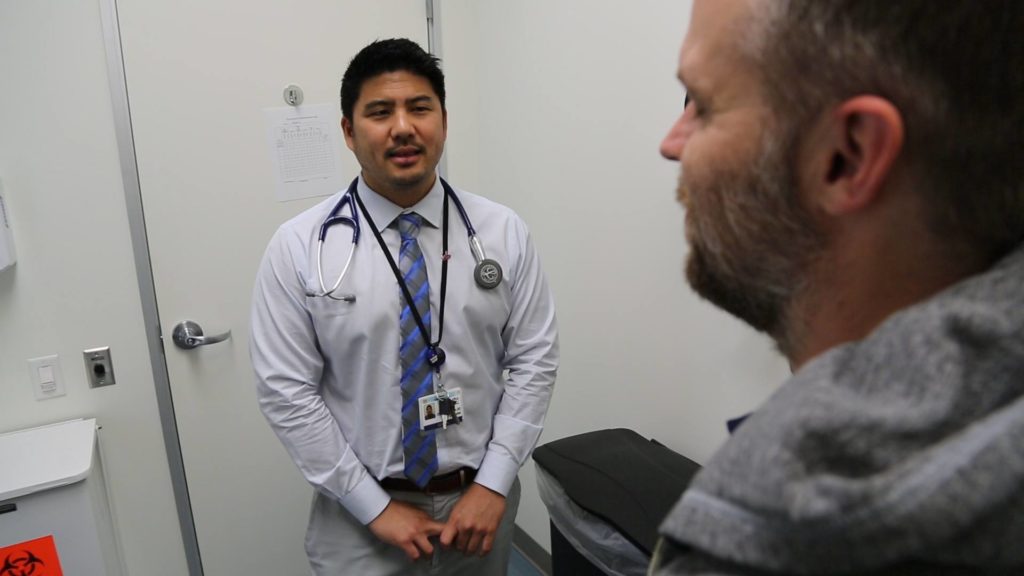Get Help Today 1-855-815-9727
Importance of Finding a Provider Who Understands
From substance abuse to intimate partner violence to peer bullying to loneliness, LGBTQ people experience mental health challenges that many times require professional assistance and support. But for many LGBTQ+ individuals, finding a doctor or provider who understands them is a challenge. Many fear being judged by their provider. Many don’t tell their provider all the details of their physical or mental health. With this disconnect between client and provider, the client loses. Finding a provider who understands you, the entire you, is the most important thing in getting the best possible care. From addiction recovery and treatment to ongoing behavioral health services; culturally affirming and competent care results in better health outcomes.
Huber had been previously been to a non-LGBTQ+ friendly doctor and when he received his HIV diagnosis the doctor reacted in a culturally tone-deaf manner. Huber was stunned, hurt, and lost. He immediately lost trust in the medical community and retreated. He stopped taking his life-saving medications and allowed his health to plummet.
It wasn’t until Huber connected to an LGBTQ+ affirming doctor that his life changed for the better. He knew he was welcome and that he mattered. With that honest connection to someone who understood what a gay man feels, he becomes happier, healthier and was able to get his viral load to undetectable levels.
LGBTQ Community Disproportionately Impacted By Mental Health Issues
APLA Health has been offering counseling services and dental services since the 1980s and started offering primary care services in 2014. Our health services are free or low-cost to anyone in Los Angeles County, regardless of income, sexual orientation or history of drug abuse. Both Westwind Recovery® and APLA Health know the importance of mental health and breaking the stigma that’s often associated with seeking help; especially within the LGBTQ community, who disproportionately are impacted by mental health issues
Studies of LGBTQ individuals have found that among lesbian, gay, and bisexual adults —
- One in three experience mental illness.
- 20%-30% of LGBTQ people abuse substances, compared to about 9% of the general population.
- 25% of LGBT people abuse alcohol, compared to 5-10% of the general population.
- Those who experience stigma in their community die on average 12 years earlier than those LGB individuals who do not.
- Older gay men report having fewer close friends than straight people or lesbian women, compounding feelings of loneliness. Last May, Cigna released the results of a countrywide survey reporting that many U.S. residents experience loneliness.
- A survey from the American Psychiatric Association reports that 39 percent of people are feeling more anxious than the previous year.
But by having places that provide judgment-free care, we know that we can make important changes in behavior because it comes from a place of understanding – and sometimes commiseration.
Roots Of Self-Destructive Behavior
One of the clients at APLA Health is a 32-year-old gay man who misused drugs to cope with his feelings. But, with the help of a compassionate and understanding counselor, he identified some of the roots of his self-destructive behavior:
- Being raised in a fundamentalist religious household that demonized homosexuality
- Episodes of intimate partner violence
- Anxious attachment behavior
- Low self-esteem
- Loneliness
Without ongoing therapy in a setting with culturally competent LGBTQ+ providers, he might not have understood how those causes led to his self-destructive behavior and learned more productive ways to cope with his emotions.
Tips for Talking to Your Provider
(from the National Alliance on Mental Illness)
- If you feel comfortable, come out when you meet with your provider.
- Ask questions about the provider’s experience working with LGBTQ people.
- Be confident about disclosing relevant information about your sexual orientation and/or gender identity.
- Be open about your thoughts and feelings of depression, suicide, anxiety, fear and self-harm.
- Ask for more information about any health-care-related referrals, including to other therapists and psychiatrists.
Breaking Down Stigma Within the LGBTQ Community
LGBTQ positive and affirming behavioral health workplaces and employees means that these services are available to even more individuals; helping to break down the stigma that surrounds mental health and seeking care.
Some of the harmful effects of stigma can include:
- Reluctance to seek help or treatment
- Lack of understanding by family, friends, co-workers or others
- Fewer opportunities for work, school or social activities or trouble finding housing
- Bullying, physical violence or harassment
- Health insurance that doesn’t adequately cover your mental illness treatment
- The belief that you’ll never succeed at certain challenges or that you can’t improve your situation
In a survey of LGBT people, more than half of all respondents reported that they have faced cases of providers denying care, using harsh language, or blaming the client’s sexual orientation or gender identity as the cause for an illness. If you do not have access to a provider who is LGBTQ+ friendly; then you won’t seek treatment – It’s that simple.
Any organization that provides behavioral health, addiction recovery services, or other support services must not lose sight of their focus to help people. They should open their doors and hearts to everyone and work with them to create a care plan that is right for them.
Derrick is a young man who describes his former life as chaotic. He went from an unstable situation to a stable situation and ended up abusing drugs and homeless before finally seeking housing support from APLA Health. That single action changed his life. In addition to housing support, he was able to see a counselor on a regular basis – leading to his sobriety – and he was able to participate in our Vance North Necessities of Life Program – where he learned to cook his first turkey in time for his birthday.
An organization that didn’t understand and support LGBTQ individuals probably wouldn’t have been able to allow Derrick to turn his life around.
Now he says he is a stable place and actively advocates on behalf of APLA Health breaking down the stigma of asking for help. Derek even referred a friend to APLA Health’s housing support services- the same place he began his journey and he even calls a member of staff his mentor.
The importance of an LGBTQ+ friendly health provider and facilities can’t be overstated. It’s important that these safe spaces are created to allow each individual to live and thrive. From ensuring better health outcomes to breaking down stigma so that people seek care in the first place; it’s important for organizations like Westwind Recovery® and APLA health to continue to provide care for individuals who until recently, lived in a world where they might not have been accepted.
Author: Alex Medina, Director of Communications APLA Health
[kkstarratings]

Dr. Deena is the Chief Clinical Officer of Westwind Recovery®, an award-winning outpatient treatment center in Los Angeles where she oversees the clinical and administrative program and treatment methods. Dr. Deena is a doctor of psychology and licensed clinical social worker since 1993. LCSW #20628. Originally from the East Coast, Dr. Deena has worked running treatment centers, worked as a therapist in psychiatric hospitals as well as school settings and currently has a thriving private practice in the LA area. Dr. Deena has appeared regularly on the Dr. Phil Show as an expert since 2003. She has also been featured on many other TV shows, podcasts and has contributed to written publications as well as podcasts.








